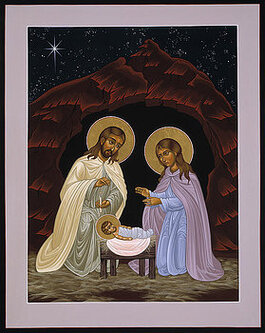 the presence of Jesus Emmanuel the presence of Jesus Emmanuel Christmas has arrived with many beautiful hymns and carols, completed crèche scenes, and the knowledge that unlike what the culture tries to say, it is a season that is just beginning, not ending. Hopefully, we were able to immerse in Advent without bypassing it in an attempt to get to Christmas before its time. Now we can reflect upon that first Christmas when the Son of God arrived in a stable and rested in a manger, the events of which were virtually hidden from the world at large. His arrival was announced to the humble and lowly who were completely surprised, astounded by the song of angels. Most of us will not see or hear angels singing so it is important to ask ourselves how we have recognized His presence without those signs. Of course, we have heard the Gospels and know the ‘story,’ but after the Feast of the Nativity the challenge will be that of continuing to recognize the presence of Jesus Emmanuel. This thought brings to mind a 14th century Christmas greeting: “Thou shalt know Him when He comes not by any din of drums nor by the vantage of His airs nor be anything He wears, neither His crown nor His gown. For His Coming known shalt be By the Holy Harmony His Presence makes in thee!” 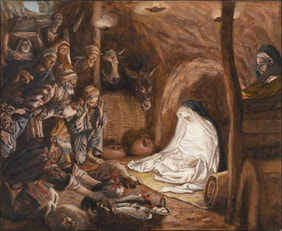 the holy harmony of our newborn Lord the holy harmony of our newborn Lord As we reflect upon the coming of Jesus, it is important to sit at the foot of the manger in adoration, gratitude, wonder, and awe. In that contemplation we can immerse in His presence, drinking in the holy harmony of our newborn Lord. In our prayer we can observe the baby Jesus and therefore get to know Him with the desire that we will continue to recognize His presence. At the time of His birth there were many who seemed unfamiliar with the prophecies or did not regard them as truth.* And later, even for those who did know the prophecies, Jesus still emerged and acted in enigmatic ways, challenging those who heard His words and witnessed His deeds. But who was it that saw, heard, and believed? It was the unlearned fishermen and shepherds, the poor, the humble, the outcast, and the alien. Why did they recognize Him? And why, for the most part, did those who should have known better not know Him? And which are we? 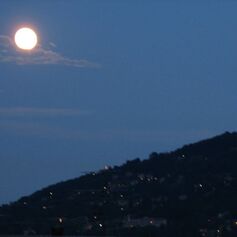 listening, learning and being open listening, learning and being open It is rather interesting, as well as shocking, that one who recognized the Messiah rather quickly was Herod the Tetrarch, a self-indulgent, arrogant, jealous, impulsive, scheming, and power obsessed man who fancied himself a king. He was disingenuous with everyone from the Romans he patronized to maintain power, to the Magi toward whom he acted as if with good intention. It is clear: Herod did recognize Jesus as revealed in his consultation of the chief priests and scribes concerning the prophecies in the Hebrew Scriptures. (Matthew 2:1-12; specifically Mt 2:3-6) That he was so threatened by Jesus’ kingship is evidenced in his unfathomable crime of ordering the murder of all the male children under the age of 2 in the vicinity of Bethlehem in an attempt to safeguard his own power. Herod's downfall, (and that of all those future adversaries that recognized the true idenity of Jesus on some level and subsequently felt threatened), was that he allowed his sense of recognition to be overpowered by his own needs, desires, and will, rather than listening, learning, and therefore being open to receiving God’s mercy and love.** 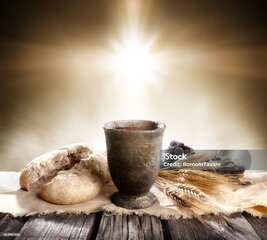 especially blessed are those who recognize Him without having to be told especially blessed are those who recognize Him without having to be told Of course, there were also those of faith who recognized Jesus readily. They were Elizabeth, Zechariah, and John the Baptist; the Magi and shepherds, and people like the prophets Simeon and Anna. Of these, especially blessed are those who recognized Him without having to be told, without a word being spoken to them about it, such as the Magi who had nothing but a star, or Anna and Simeon who prayed, believed, and as a result, recognized so as to welcome Him. For the most part, those who would accept Jesus were the humble, the broken, the lowly, the poor: they were the ones who hungered and thirsted for God and His kingdom. They would recognize Jesus because their hearts were open. This is not to say any of them were perfect, just as we are not perfect; but those who seek will recognize, and therefore, find. We can choose to be like them, recognizing Jesus in our brokenness, our wandering, and poverty (whether monetary or spiritual or both). We, too, can find Jesus if we learn humility, embrace simplicity of heart, and open ourselves to His will, trusting that His will is far better than our own because He is far wiser than we could ever be. We, too, can find Jesus if we hunger and thirst for Him over and above any ideology, political viewpoint, or opinion. We can learn to always find Him if we sit at the manger getting to know Him in the silence and the beauty of His arrival. 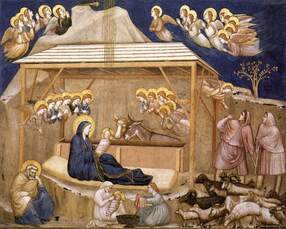 sit in the silence of the stable sit in the silence of the stable If we learn to recognize the presence of Jesus Emmanuel through the beauty of what God did on that holy night, what was brought to fruition through the humility of His handmaid Mary and the courage of His foster father, Joseph, we can find Him and will continue to find Him in our own day-to-day living through the Christmas season and long after it is over. So let us savor our time at the manger: if we sit in the silence of the stable during this season we will “know Him when He comes…. by the Holy Harmony His Presence makes in thee!”  Glory to God in the Highest! Glory to God in the Highest! May we learn to recognize Jesus when He comes in simplicity as a Baby in a manger! May our hearts be open to recognizing Jesus in the humble of heart and poor of spirit! May we recognize Jesus by the Holy Harmony of His presence when we let Him take up residence within our hearts! Let us meet at the manger! Christmas Peace! © Michele L. Catanese * I am referring to the Pharisees and Sadducees, the latter of which did not even believe in a messiah-to-come and only accepted the Torah, (but not any of the other parts of the Hebrew Scriptures.) Ordinary people who were influenced by the teaching of the Pharisees awaited the Messiah with longing, and those influenced by the Sadducees, such as the priestly class, did not accept the prophets either, so they did not believe a messiah was to come. ** First, it must be said that Herod recognized without real understanding and without a shred of faith. Second, I have only written of Herod for the sake of this Christmas reflection, but anywhere there is evil, there is the recognition of who Jesus is (which is why these forces attack); most obviously, Scripture reveals that demons always recognize Him and some even call Him by name as the Son of God. Evildoers would also include the Pharisees and Sadducees when they wanted Jesus put to death, Judas who misunderstood and betrayed Him, Pilate who caved in to the demands of the crowd, and so forth. Images: 1. Image; The Nativity of Our Lord Jesus Christ by Fr. William Hart McNichols. You can find this at fineartamerica.com/featured/the-nativity-of-our-lord-jesus-christ-034-william-hart-mcnichols.html 2. Painting; The Adoration of the Shepherds (L'adoration des bergers) by James Tissot (1886-1894). 3. My photo; the moon over Stresa, Italy. 4. Photo; Communion Unleavened Bread Chalice of Wine by Romolo Tavani. 5. Fresco Painting; Nativity, by Giotto. (Assisi) 6. Painting; Tidings of Joy. (unknown) Note: In compliance with GDPR rules, I wish to make it clear that I do not gather any information on any of my readers at any time. 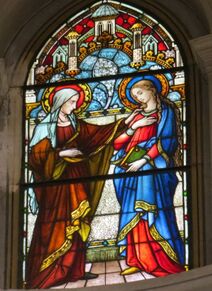 the child in Elizabeth's womb leapt for joy the child in Elizabeth's womb leapt for joy One of my favorite memories is of a surprise birthday party a friend gave me a number of years ago. It was totally unexpected, a true surprise which moved me to gratitude. I suspect that is why I have always loved the passage in the Gospel of Luke in which Mary travels to Elizabeth’s house to serve her pregnant cousin. It is clear that Mary’s arrival was unexpected because Elizabeth cried out: “And how does this happen to me that the mother of my Lord should come to me?” (Luke 1:43) Elizabeth’s joy was enhanced by amazement and awed recognition: she simultaneously recognized Mary’s role as well as the presence of the Son of God whom she was carrying in her womb. So deep was this recognition that at Mary’s greeting even the child within Elizabeth’s womb leapt for joy. She was filled with gratitude to God at her own pregnancy, and yet God had more to give her in sending these unexpected guests. Elizabeth must have felt incredibly special, deeply loved, that the coming of the Messiah was not only revealed to her, but that He made Himself present to her in this way. The joy of these converging realities is unimaginable. 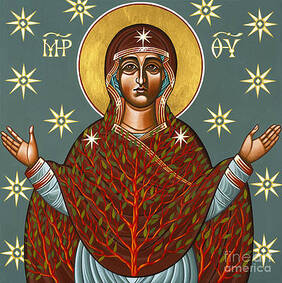 burned without being consumed burned without being consumed We may think this surprise by God was unique, and yet isn’t this how God always behaves? If we think about the great figures in the Old Testament, we will realize that God arrived unexpectedly to call many of them into His service. For example, God came to Moses when he was tending flocks, coming in a truly unprecedented way through a bush which burned without being consumed. Thus, we can imagine the shock that Zechariah, (a Sadducee), experienced when the angel came as he was doing his priestly duties in the Temple. He never expected a heavenly visitor who would bring the incredible message that not only would he have a son, but that this son would be the forerunner of the Messiah! Zechariah was so surprised, (unbelieving), he was rendered speechless!* As with Zechariah, we can be sure that Mary was not expecting an angel on the day of the Annunciation. She was a woman of deep reflection and prayer who loved God with a depth of purity we cannot comprehend. Mary was always waiting on God as His “handmaid” (Luke 1:38), and with such an interior attitude, she was also always ready to respond. However, rather than one of incredulity, her response to the unexpected was humbly faith-filled; all she wanted was to know how she might fulfill God’s will. 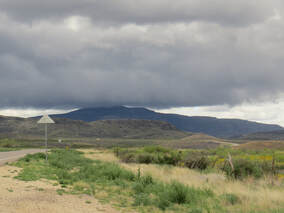 we are invited into the waiting we are invited into the waiting The theme of expectant waiting is an important part of Advent, but it is important that we consider the unexpected as well, (especially since we know Jesus will return at an unexpected time.)** Although all of Israel had been awaiting the coming of a Messiah, everything about who Jesus was and how He came was anything but expected: He was neither king nor from a family of rich estate and no one expected that He would be the Son of God. The arrival and ministry of Jesus was awaited, but all of how it came to be and what He came to do was not what was envisioned by anyone (except perhaps the great prophets ‘of old.’) Thus, in Advent we are invited into the waiting, but we are also challenged to open ourselves to God’s entrance into our lives in a new, perhaps unexpected way. 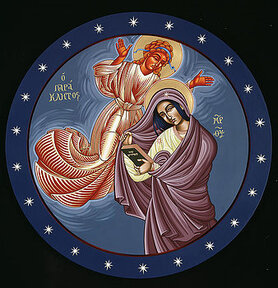 openness, welcome, humility, and gratitude openness, welcome, humility, and gratitude Praying with both Mary and Elizabeth’s response to surprise is a way to open our minds to how we ought to respond when called. Mary responded to the angel’s announcement by welcoming the Holy Spirit in His ‘overshadowing,’ and her humble gratitude spilled outward in service. Elizabeth’s question to Mary is also important because it reflects the disposition of heart we need to have: it flows from a heart oriented to openness, welcome, humility, and gratitude. She knows who she is before God and as a result she is able to offer the Son of God and His mother a place of welcome, her joy arising from her gratitude at their presence. Therefore, if we want to be prepared for the Lord this Advent we can turn to Elizabeth and adopt her inner disposition as our own. We can study and pray with the first two chapters of Luke’s Gospel as a way to learn from both holy women. We can examine how open we have been to God, whether we have welcomed Him (especially when He surprises us), and whether we have greeted Him with humility and then gratitude. And finally, we can ponder whether we would have the faith of Elizabeth so as to welcome Him when we think whatever we are grappling with is an impossible situation. If we need help in any of these areas, we can ask the Lord for the graces we need.  my soul proclaims the greatness of the Lord! my soul proclaims the greatness of the Lord! It is important to recognize that every day the Lord of Heaven and Earth does come to us. If our hearts are open to His arrival, we will learn to always expect Him, although the how and when may come as a surprise. And when He comes, similarly to Elizabeth, we can humbly ask: “How does this happen that my Lord should come to me?” Now, as always, His response will be one of love and mercy. And hopefully we will echo Mary’s words after meeting Elizabeth whose baby leapt: “My soul proclaims the greatness of the Lord!” 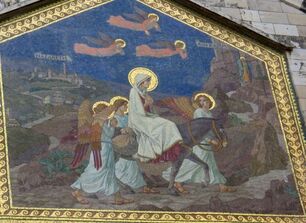 may we allow Mary, pregnant with Jesus to come to us may we allow Mary, pregnant with Jesus to come to us May we allow Mary, pregnant with Jesus, to come to us that we might contemplate the mystery of how she bore Him in her womb with love beyond all telling! May we be like Elizabeth with a disposition of openness, welcome, humility, and gratitude for Jesus’ great gift of presence so that when He arrives our heart will leap for joy! And may we receive the unexpected graces God intends for us this Advent! Let us meet in the graces of the Visitation! Peace! Marana tha! Come O Lord! ©Michele L. Catanese Note: My next post will be on Tuesday, December 26 which is a day later than usual. Christmas blessings to all! * Zechariah must have been a Sadducee because these were the priestly class of Jews; remember, Sadducees did not believe there was such a thing as a Messiah. And yes, I have taken a liberty meant for emphasis with why Zechariah was rendered unable to speak. It was actually his disbelief which was 'disciplined' by the angel that caused his tongue to cease to function. ** The word Advent means “an arrival or coming, especially one which is awaited."(dictionary.com) Therefore, it infers expectation since awaiting something means we are both hoping and expecting that it will come at some point. We must also remember that what we prepare for at Christmas is not just a celebration of the Incarnation, important as that is, but we are preparing for the Second Coming of Christ. Images: 1. My photo; a stained glass window in the church of the Visitation taken in Ain Karim, the place where the Visitation is said to have taken place in Israel. It seems to me that Elizabeth is depicted just as she is saying, “And how does this happen to me that the mother of my Lord should come to me?” 2. Icon; Mt Sinai Theotokos the Burning Bush, by Fr. William Hart McNichols. I love this icon because it combines the unexpected arrival of the Son of God within Mary, but also that she is burning with the fire of God's love that does not consume her literally, but which burns intensely within her. 'Love Who is God' joins His divinity with humanity within her. If you would like to obtain a copy of this icon, you can find it at fineartamerica.com/featured/mt-sinai-theotokos-the-burning-bush-131-william-hart-mcnichols.html 3. My photo; waiting for rain, taken in Big Bend National Park in Texas. It was clear that rain was coming and we sat watching and expectantly waiting. 4. Icon; The Mother of God Overshadowed by the Holy Spirit, by Fr. William Hart McNichols. This has to be one of my favorite icons because it contains such mystery and beauty. Again, if you are interested in purchasing a copy of this in one of many mediums, go to fineartamerica.com/featured/the-mother-of-god-overshadowed-by-the-holy-spirit-118-william-hart-mcnichols.html (Remember, I do not get any remuneration from my endorsement of the work of by Fr. Bill, except the joy of sharing the beauty of his icons.) 5. My photo; in the highlands of Scotland. This is a place of beauty and tranquility, thus the presence of God was tangible to me there. 6. My photo of a painting; Mary riding on a donkey accompanied by angels as she traveled to see Elizabeth. This painting is on the exterior of the Church of the Visitation, Ain Karim, Israel. Note: In compliance with GDPR rules, I wish to make it clear that I do not gather any information on any of my readers at any time. |
Heart Speaks to Heart
|

 RSS Feed
RSS Feed

